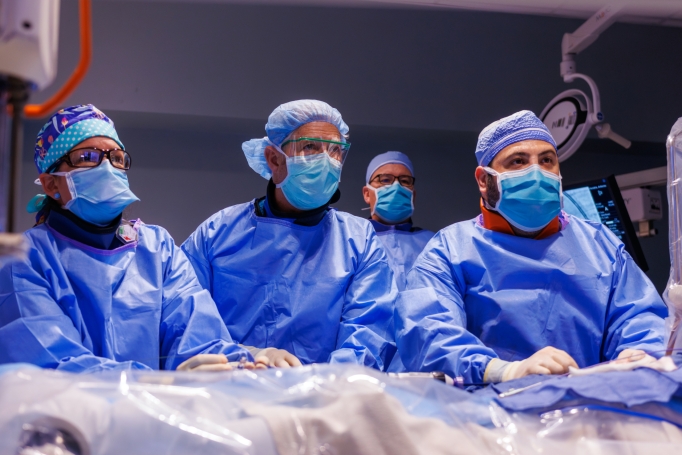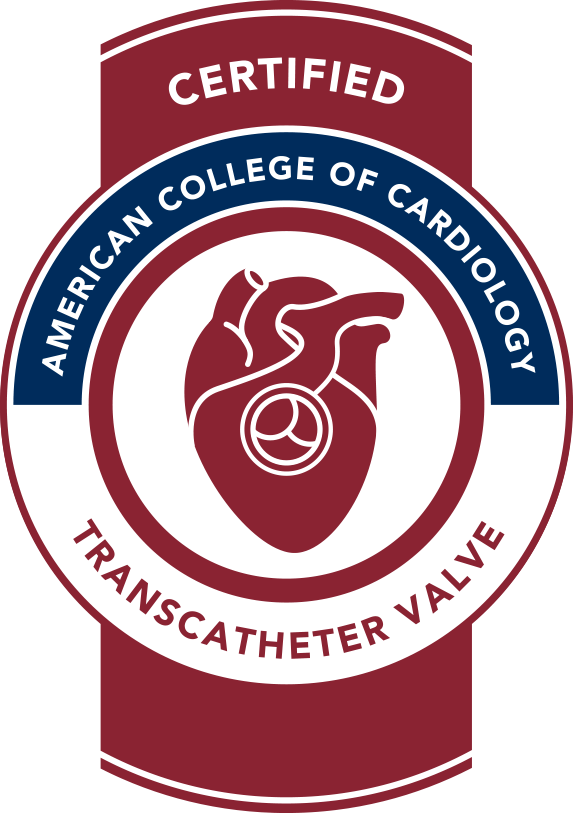TAVR Excellence – A Heart Team Approach

By Brian Blaker, MD, FACC, McLeod Structural Heart Cardiologist
Since 2017, the McLeod Structural Heart Program has replaced diseased heart valves using the Transcatheter Aortic Valve Replacement (TAVR) procedure for more than 450 patients. TAVR is a minimally invasive procedure that allows physicians to replace a patient’s diseased or damaged heart valve without removing the old valve.
The TAVR procedure, including the pre-procedural evaluation and post-procedure care, requires a collaborative, multidisciplinary team effort. We could not do this without the physicians and staff working together for the benefit of the patient. As a group, we identify the patient, then plan and perform the TAVR procedure. Everyone brings to the team their experience and expertise for the optimal care of the patient.
The McLeod Structural Heart team physician members include Cardiothoracic Surgeons Dr. Srinivas Kolla, and Dr. Cary Huber; Structural Heart Cardiologists Dr. Ravi Parikh, and Dr. Brian Blaker; and Cardiovascular Anesthesiologists Dr. Daniel Fox, Dr. Robert Savage, Dr. Robert Casella, and Dr. Yaroslav Yatsky.
Additional invaluable support is provided by the exceptional team of nurses, surgical and radiological technologists, pharmaceutical staff, and social workers who participate in the care of patients with valvular heart disease. This also includes dedicated Structural Heart Navigators Chelsea Matthews, RN; Traci Berri, RN; and Structural Heart Advanced Practice Provider Chelsea Atkinson. The McLeod Structural Heart team works tirelessly to ensure the process of evaluation and treatment is as seamless as possible for patients in their time of need.
Recently the McLeod Structural Heart Program achieved the American College of Cardiology’s Transcatheter Valve Certification, the second program in the state of South Carolina to achieve this prestigious recognition. This designation by the American College of Cardiology recog nizes expertise and commitment to high-quality outcomes in treating patients receiving transcatheter valve repair and replacement. Certification is based on the evaluation of our team’s ability to meet specifications for formalized training, shared decision-making, and registry performance for excellent patient care outcomes.
nizes expertise and commitment to high-quality outcomes in treating patients receiving transcatheter valve repair and replacement. Certification is based on the evaluation of our team’s ability to meet specifications for formalized training, shared decision-making, and registry performance for excellent patient care outcomes.
Certification also provides the framework to maintain high-quality standards. The certification uses established national clinical measures to support clinical decisions and fosters process improvement in patient outcomes. Hospitals that achieve Transcatheter Valve Certification are equipped with best practices for identifying opportunities and implementing strategies to ensure high-quality patient care.
The TAVR procedure is most commonly performed for a disease called aortic stenosis. Patients with aortic stenosis, or other forms of valve disease, often experience symptoms such as profound fatigue, and shortness of breath particularly with exertion. This can make everyday tasks difficult to manage which impacts quality of life. Other symptoms patients might experience include chest pain, fainting, or an overall feeling of weakness. Patients experiencing any of these symptoms should inform their primary care provider or request an evaluation with McLeod Cardiology Associates.
Patients with valve disease can be referred to the McLeod Valve Clinic where they will meet with our team of Structural Heart disease specialists for evaluation and discussion of treatment options. Our Structural Heart Navigators will provide additional education, answer questions, and help arrange any necessary testing, such as lab work, echocardiogram, CT scan, cardiac catheterization, lung test, and/or vascular ultrasound when appropriate.
Once results are available, the findings are reviewed as part of our multidisciplinary Heart Team committee meetings to determine the optimal treatment plan for each individual patient’s unique circumstances and goals of care.
TAVR is performed in a similar manner to heart catheterization and is typically done through a very small incision in the groin. During the minimally invasive procedure, the physician inserts a catheter, a long flexible thin tube with an artificial valve, into an artery. The physician then guides the catheter to the heart using X-ray imaging. Once precisely positioned across the diseased valve, the new valve is expanded and starts functioning immediately. The old valve provides the foundation to hold the new valve in place.
Although the majority of TAVR procedures are performed through an artery in the groin physicians can also access the site through other arteries when necessary, such as for patients with peripheral vascular disease or blockages in the arteries of the lower limbs. In some cases, arteries in the upper chest or neck can be used as an alternative. These alternate access sites ensure the eligibility of even more patients.
McLeod Vascular Surgeons who specialize in operating on the veins and arteries in the body, assist the Structural Heart Team with access to the carotid artery. These Vascular Surgeons, Dr. Carmen Piccolo, Dr. William Jackson, and Dr. Luke Stewart, participate in the TAVR procedure whenever called upon.
Dr. Brian Blaker is an Interventional and Structural Cardiologist with McLeod Cardiology Associates. He serves as the Medical Director of the McLeod Structural Heart Program. Structural heart disease can be present at birth or develop with age. It refers to defects in the heart’s valves, walls, or chambers.
Physician and self-referrals are welcome by calling 843-667-1891.
Pictured in image: McLeod Cardiothoracic Surgeon Dr. Cary Huber, at left, and McLeod Structural Heart Cardiologist Dr. Brian Blaker, at right, perform transcatheter aortic valve replacement (TAVR) procedures at McLeod Regional Medical Center.
-
McLEOD REGIONAL MEDICAL CENTER FLORENCE
843-777-2000 -
McLEOD DARLINGTON
843-777-1100 -
McLEOD DILLON
843-774-4111 -
McLEOD LORIS
843-716-7000 -
McLEOD SEACOAST
843-390-8100 -
McLEOD CHERAW
843-537-7881 -
McLEOD CLARENDON
803-433-3000



-
McLEOD REGIONAL MEDICAL CENTER FLORENCE
843-777-2000 -
McLEOD DARLINGTON
843-777-1100 -
McLEOD DILLON
843-774-4111 -
McLEOD LORIS
843-716-7000 -
McLEOD SEACOAST
843-390-8100 -
McLEOD CHERAW
843-537-7881 -
McLEOD CLARENDON
803-433-3000
 Find a Doctor
Find a Doctor  Locations
Locations  Services
Services